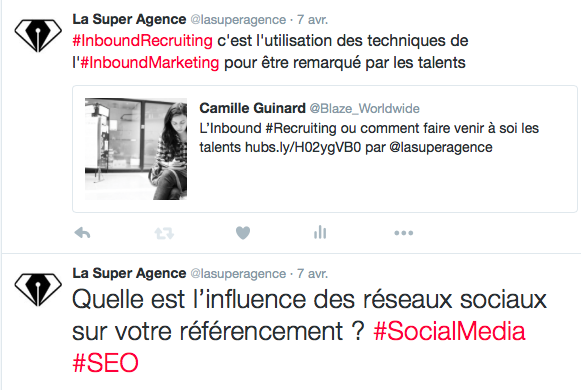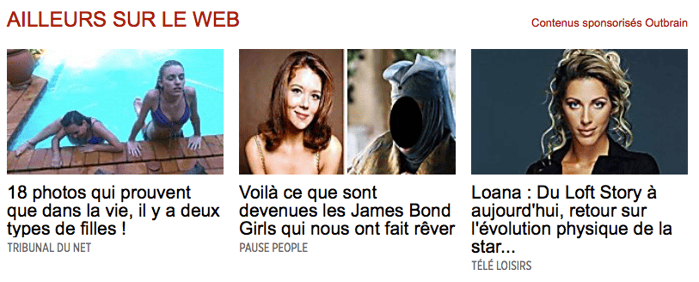Headline writing should never be overlooked. Spending a little time testing and finding the right tagline can have a huge impact on your traffic!
Here are 10 rules to help you write a catchy headline for the web, that is, for both search engines and your leads.
A good title means more people click on your post when they see it on your main blog page or on social networks.
This way, the time and effort you will have spent on writing an article will not be wasted.
Here are some helpful pointers for writing your headline. Note that it's not about coming up with sensational titles that will get you traffic in the short term, but rather titles that showcase a quality article.
What are the requirements for a title to be catchy for the web?
1 - A title must (still) be descriptive
The strict rules originally imposed by the SEO have done a lot of damage to creativity.
Many lament today that headlines no longer use puns or puns like those of Liberation.
These headlines are fun and they still have a bright future in print but the web needs more descriptive headlines.

Your headlines should inform the user about the content they are about to view!
The problem with non-descriptive titles is that they don't work out of context. Also, the title has a very significant effect on ranking.
So a quirky, humorous title doesn't work for the SEO (yet).
A headline therefore needs first and foremost to tell the search engine, and then secondarily the reader, what to expect.
2 - Avoid racy titles
The definition of clickbait varies from person to person, but everyone agrees on the racy titles.
This kind of not-at-all-qualitative-content arrives at the bottom of respectable online media. Here, it's an article from the Point on the Brussels attacks. And this is what is offered next...
It leaves you speechless doesn't it?
Click traps also refer to headlines that make sleeve effects and deliver nothing afterwards. Too much hyperbole, promises of all kinds, etc.
Yes, headlines need to be catchy but there is a certain balance to be found. Headlines that promise the moon and drive traffic will ultimately disappoint the surfer who won't come back.
This cannot be a long-term winning strategy in a Inbound Marketing, which is based on the notions of trust and engagement.
3 - Titles must function independently
When we write article titles, we place them at the top of the page without thinking that they will often be seen out of context, that is, without the text that follows.
They will be seen in tweets, on news feeds, in directories, on the results page on search engines and more.

These two headings inform the user about the content they will be viewing and are understandable out of context.
4 - Think about the length of titles
The web restricts the length of your headlines. Keep this in mind when writing your tagline.
- Google shows the 55 to 60 characters on your page title. Ideally, make sure you stay under 55 characters or consider the cutoff that will occur and see if comprehension is blurred or not.
- The social-networks also have character limits in their titles. For example, if you want to tweet an article, adding the URL and image. The title will only be shorter.
- The length of headlines on newsletters varies by medium (mobile or desktop). The shorter the headline, the more likely it is to be seen in its entirety.
5 - Don't promise offers you can't deliver
A promising teaser that leads to disappointing content infuriates. However, sometimes this is a lack of quality.
If you advertise "the best plans" when all you are doing is repeating unoriginal information gleaned from the web, you will disappoint.
There is a certain tendency to use hyperbolic adjectives on the web that is akin to overselling such as "the incredible secrets that will win you fans every time."
If you're going to put out this kind of headline, you need to make sure that the content that follows is up to snuff.
6 - Be concise
As we saw in point 4, there are a good number of reasons to create a relatively short title.
Look at your headlines. Is every word in them essential? If not, make them shorter.
7 - Watch what works and repeat your successes
Look at your analytics results and determine which posts are most shared on social networks.
Can you observe common qualities in each of them?
It's helpful to look at the analytics on each of the mediums. What works on social networks is not necessarily the same as what works in terms of traffic or lead conversion.
8 - Add keywords to your titles
The rule has always been to fit as many keywords as possible into a title. Apparently this element is no longer as important to Google.
However, it is important to make sure that the essential keywords are included.
Relevance more than frequency
This will help you in your ranking, will allow your articles to be found on social networks as well as in Google queries.
9 - Don't be afraid of lists
It's easy to make fun of lists, but the fact is that they work well on the internet.
Everyone loves lists. These formats indicate that the article has a well-defined form. Therefore they are easy to read and share.
Of a sample of 10 articles published on The Super Agency blog, 6 are lists.
Articles that answer a question also work well. In each case, the reader's curiosity is piqued and they click.
10 - Make it collaborative
Sometimes the idea comes on its own, but it often helps to discuss with colleagues and a new idea will emerge.
You may think your choice is the right one, but it also happens that someone else has a better idea yet.
In summary
There are essential elements to consider when writing a title, rules to follow and pitfalls to avoid.
But the title should also reflect the personality of a site and its readership.
You should also change the tone and form from time to time. If all your headlines are just lists, readers will get bored (unless you are Buzzfeed).












